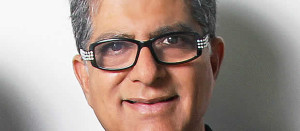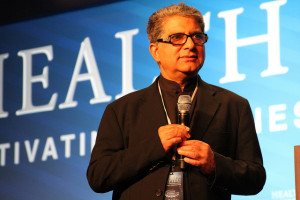In troubled times, when the world seems to be on fire, people think about God and the religion they were raised in — a source of solace and hope matters more in a crisis. I don’t find myself thinking about spirituality in those terms, however. Like a winter coat that’s put away in spring, for many people spirituality, in the sense of going to church or praying to God, gets put away when the crisis has passed.
Crises by their nature, come and go, but the deeper need for spirituality remains. This need is rooted deeper than solace and hope. It’s the need for wisdom. Wisdom is a word that’s open to cheap shots and automatic dismissal. It’s even alien to the kind of spirituality that’s about issues like self-esteem and love. Wisdom is much less personal and mysterious. It gets at the heart of why we exist and what our purpose is. Wisdom gives you a vision of possibilities that are found in consciousness, bridging all ages and circumstances. It gets at the heart of reality. Ultimately the search for reality is what binds a loose coalition of people who want to reach beyond organized religion and its perceived drawbacks.
Ever since Aldous Huxley coined the phrase “perennial philosophy,” people in the West have come to realize that sectarianism is too narrow and religions too orthodox to contain a great body of wisdom that is available to every culture. The spiritual scene unfolding around us is just today’s Americanized version of the perennial philosophy, as Theosophy was the British version at the turn
of the century. In a word, the perennial philosophy is about transcendence. It’s a corpus of thought which holds that higher consciousness is real.
For many spiritual people there’s little doubt that organized religion is serving reactionary social forces and a dogmatic version of God. This has left a spiritual vacuum in society, and although many right-thinking people ridicule the carnival aspects of the New Age, it is far more deplorable to ignore the spiritual yearning that exists in every culture. The current spiritual scene may not fill the vacuum perfectly, but it has many virtues.
— People feel free to express themselves outside the doctrines of organized faiths.
— They feel open to experiences that earlier generations denied or condemned, and that arch materialists totally deny.
— They are aware that spirituality is a broad river running back many centuries.
— They feel included in a magnificent human quest.
— They believe that evolution of consciousness is real and worth pursuing.
— They believe they can find a noble vision and begin to live up to it.
These values are timeless but remain abstract until they become someone’s personal experience, and the current spirituality embraces a huge number of people who have tasted transcendence through meditation and various forms of peak experience—those moments when the veil of the personal self drops away and reality is seen without interference by the ego, memory, and old conditioning.
The seekers one meets vary enormously: Jungians and other therapists who were brought up in the ‘50s, freethinkers and flower children from the ‘60s, and even earlier Theosophists, followers of teachers like J. Krishnamurti and gurus, not to mention readers of Huxley, Gerald Heard, and other expatriates who brought Vedanta to Southern California in the era before World War II. It’s a big tent and hardly new.
The net result of this diverse movement is hard to calculate. Certainly there don’t seem to be many inroads into orthodox political or academic thought, but as a grass-roots movement, spirituality is powerful; it stands for the unquenchable idealism of millions of people who either flirt with the perennial philosophy or dive into it more deeply.
I don’t see an alternative, frankly, unless a person wants to mount a rearguard action to revive organized religion, and that seems highly unlikely. The liberal wing of every major Christian denomination has become quiescent in the face of aggressive fundamentalism, and adopting an Eastern religion has its own compromises. So whatever the spiritual scene morphs into thirty years from now, it seems to be the most viable movement we have, and it deserves to be considered on its own terms, without labels but with a love for wisdom and human possibilities.
Deepak Chopra
DEEPAK CHOPRA GIVES COMPELLING LECTURE
ON “THE FUTURE OF WELL BEING” AT THE BROWARD CENTER FOR THE PERFORMING ARTS
revolutionary expert in the field of mind-body healing, Deepak Chopra is a world-renowned speaker and author on the subject of alternative medicine. In his compelling lecture at the Broward center, he discussed principles from his latest book “Super Genes” and how to unlock the power of your DNA for optimum health and wellbeing.
Chopra, who is Board Certified in internal medicine, endocrinology and metabolism, combines principles from Ayurveda (Hindu traditional medicine) and mainstream medicine on mindbody relationship that he believes can actually extend the human lifespan and treat chronic disease. He stresses that mindfulness can expand your awareness and bring you closer to ultimate reality.
A book signing for “Super Genes,” his book co-written with Rudolph E. Tanzi, was held after the lecture. “You are not simply the sum total of the genes you were born with, you are the user and controller of your genes, the author of your biological story, “ Chopra says.
At the lecture, Chopra details the power of our genes:
“…They are dynamic, responding to everything we think, say, and do. Suddenly they’ve become our strongest allies for personal transformation. When you make lifestyle choices that optimize how your genes behave, you can reach for a state of health and fulfillment undreamed of even a decade ago. The impact on prevention, immunity, diet, aging, and chronic disorders is unparalleled.”
He also discussed how genetics is undergoing a revolution that for the first time opens the way for people to influence their own gene activity. “Only 5% of disease-related gene mutations are fully deterministic, while 95% can be influenced by diet, behavior, and other environmental conditions.” He added: that a program of positive lifestyle changes can actually alter 4,000 to 5,000 different gene activities.
Part of the evening’s enchantment was as guided meditation by Chopra where each person asked themselves the following questions:
-Who am I?
-What do I want?
-What is my purpose?
-What am I grateful for?
After, he explained that they were now in their present moment and that awareness is the key to total well being. Something he says should be practiced regularly for optimal health.
He discussed the importance of the five pillars of well being:
-sleep
-meditation and yoga, for stress management and can actually change brain waves
– movement- exercise
-emotions-staying positive, being grateful, knowing your purpose, being with supportive people
-food –eating pesticide & hormone free foods
Best quotes of the evening:
“If humans disappeared, the environment would flourish”
“Our bodies are a river of change and transformation”
“Our DNA Changes every six weeks”
“Our bodies are recycled dust”
“The present moment is our window to eternity”.
“We are timeless beings”
“You don’t want to blow up 13.8 billions of years of evolution by messing up your life.”
His revolutionary app is out:
JIYO app- personal transformation wellness platform
“The goal of Jiyo is to help people experience a joyful energetic body, loving compassionate heart, restful alert mind and lightness of being. Besides providing personalized insights, the Jiyo platform also aims to foster community through a curated network of expert content partners as well as ambassador channels from leading wellbeing experts.”
Oprah Winfrey and Deepak Chopra recently Launched the “Oprah & Deepak 21-day Meditation Experience” Titled “Shedding the Weight: Mind, Body and Spirit” as well.
Nancy Esteves


 Contact Us
Contact Us